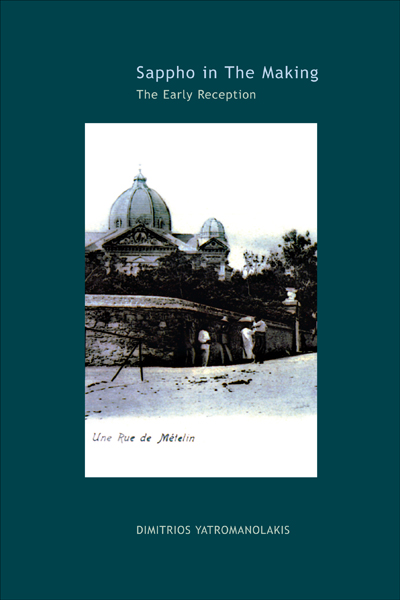
The CHS team is pleased to announce the online publication of Sappho in the Making: The Early Reception, by Dimitrios Yatromanolakis for free on the CHS website. For a print version of this edition, please visit the Harvard University Press website.
“The need to broaden our investigation is urgent. Sappho must be revisited from several different perspectives. One is her surviving textual corpus and its analysis. Contrary to what one might expect, given the amount of publications that appear every year, Sappho’s texts preserved on papyri and parchments have recently suffered a relative lack of broad scholarly attention. Current critical editions do not incorporate new material and papyrological results that would facilitate literary analysis. More importantly, many parchments and papyri were transcribed and edited in the first half of the twentieth century. In their critical edition, Lobel and Page in certain cases did not reexamine the originals, but were based on previous papyrological and palaeographical work by Schubart, Zuntz, and several other scholars. In her monumental edition, Voigt has regrettably adopted the same practice in numerous cases. In their turn, cultural historians and literary critics have based their frequently influential analyses on puzzling or sometimes inaccurate texts. Theories on Sappho have all too often rested upon further theories?linguistic, reconstructive, literary, cultural?all eventually based on the texts that Lobel-Page and Voigt offer. And, in a circular manner, literary testimonia related to Sappho are still widely used to ponder questions such as the role of girls?a marked category?in the “Sapphic circle” and in the society of archaic Lesbos.
This book does not focus solely on the ancient reception of Sappho; it mainly aims to offer an anthropological Problematik and method for the investigation of ancient social dynamics and cultural idioms. The present study does not suggest that all the ancient reception is a series of cases of fictionalization. It attempts to create a dialogue with ancient sources and cultural economies and to approach them by means of conducting, as it were, historical fieldwork, while at the same time not suggesting that our “informants” are as unambiguous and always diachronically contaminated as we would hope. The fact that ancient representations are sometimes investigated between these covers in chronological sequence does not suggest any kind of stemmatic, unidirectional or evolutionary understanding of different synchronic indigenous ideas about Sappho across time.”
Would you like to read more on Sappho? You can find a special retrospective on the oral poetics of Sappho freely available on the CHS website.
